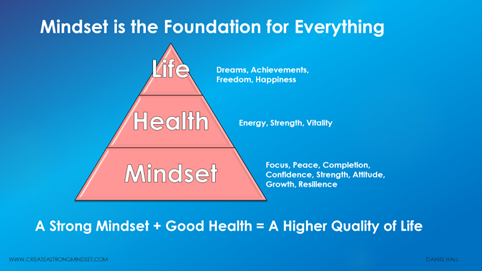Practical Steps to Overcome Past Programming and More Easily Attain the Life that You Desire.
Many people have it backwards. They convince themselves that they will feel a certain way AFTER something is achieved.
- I’ll feel confident once I lose weight, get plastic surgery, or gain muscle.
- I’ll feel loved when I find the right person.
- I’ll show the world that I am real when I have created a million-dollar business.
Sure, in the short term, it can and often does lead to positive feelings, but in the long term, it doesn’t because it doesn’t solve the real underlying need which are usually tied to a lack of self-confidence, self-esteem, or love for oneself.
“Everything you have is already inside you, and once you lift the past from your shoulders, life becomes easier.” Peter Crone
“Mind architect” Peter Crone says that you must realize that what we are seeking is already in us, but we must find a way to bring it out.
There are people who change their appearance and gain self-confidence. But, if they have deep insecurities that are linked to their self-esteem, the moment their insecurity pops back to the surface, it can cause them to self-sabotage all that they have gained.
Until they come to grips with the real problem of what caused them to lose their self-esteem, they will not really feel happy and free.
This can happen for anything.
I know people who have achieved success, and they feel great for a while. Later, I have seen them grow depressed and complacent because they feel like they are missing something in their life.
I also know people who have trouble finding love and settling down with one person. They go from person to person looking for that feeling of being loved. They will always have trouble until they learn to love themselves. Looking for someone else to provide a need will almost always end up in failure.
These feelings of inadequacies that we have deep within ourselves, are what cause us to not truly be happy and whole.
When you can find those things that caused your limiting beliefs and insecurities and reconcile them, then you can find true happiness and freedom.
To understand this, really imagine how you would feel if you could overcome your insecurities and worries.
How much better would your life be? What would your life be like if you really believed in yourself? How would you feel if you didn’t worry about what others thought? How would you feel if you could really love and appreciate who you are?
Once you let go of the worries and stress, you no longer need to fall back on bad habits that help you deal with stress and worry. Procrastination is no longer a big issue because you fear less. It’s much easier to stick to new habits and goals.
How do we bring out the things that we seek but are already in us?
You can bring it out by understanding how emotional events in your past are affecting how you think and behave, and then reconcile what you find.
How do you reconcile your past?
First, you need to find your programming.
We have a lot of programming, most of which was created in our childhood, that is executed and causes us to behave in certain ways when triggered.
This is good because we can look at our behaviors to help understand what happened in the past and find where the programs were created.
To find and understand this programming, it is important to become more self-aware of our thoughts and to look at and examine our past behaviors.
A Deep Self-Assessment
If you want to find your underlying programming, you need to do a self-assessment, and you need to do this many times. Each time, you can explore different areas, or you can dig deeper into earlier findings and see if there is something that you missed.
There are several ways to do this. This could involve meditating, writing in a journal, pretending that you are talking with a best friend who has the same problem as you, or imagining two avatars talking with each other discussing your past.
The importance is to try to put some separation between yourself and your thoughts. Thinking directly can trigger many emotions, and these emotions can cause our brain to go into protection mode activating hormones like adrenaline and cortisol which negatively impact our rational thinking.
What Things to Examine to Find Past Programming
Here are some things that you can examine that will help point you to underlying programming.
Examine your thoughts.
Your thoughts, especially negative ones, can tell you a lot about your past programming. Many people spend the day chastising themselves or having negative thoughts about their day without really being aware of it.
Learn to be aware of how you talk to yourself. When you catch yourself being negative ask yourself where these thoughts originated. What are they telling you about yourself?
If you are complaining about others in your mind, this can point to insecurities within. This is because we are comparing others to how we act and feel. We are looking to feel better about who we are. Dig deep and ask yourself why you have these thoughts and where they originated.
Examine your past patterns of failure.
Have you had ups and downs with work and business? With relationships? With love? With your health?
“The past does not define you; it informs you.” Peter Crone
Repeated patterns of failures can help point to programming that is getting in the way of permanent success.
These can point to a subconscious belief that you deserve to fail or that you are not good enough. When you have these kinds of feelings, they can lead to self-sabotaging behaviors such as giving up more easily when things start to get tough.
Examine your triggers.
When we react negatively to things, this is a big pointer to things in your past. What irritates you or angers you? How do you react when things are not going your way.
Maybe you get angry when people criticize you. Maybe you get irritated when you feel someone is disrespecting you. Things like this can point to past events such as bullying or teasing when you were young.
Examine your fears and stress.
What is causing you fear or stress now?
Do you feel fear that you will fail? Do you fear that people will make fun of you? These point to a lack of confidence or self-esteem.
Do you feel stress when thinking of big goals you want to achieve? Do other people cause you stress?
When you understand the real reasons for your fears and stress, then it becomes much easier to manage them.
Examine what others say about you.
What have you heard from others about your behavior? If they say that you tend to push back, or that you are opinionated, or that you are stubborn, what does this really tell you about yourself. Could they be right?
Here are some points to keep in mind when doing a deep examination.
Watch Your Language
One thing I really learned from watching Peter Crone is his thoughts on the language we use. The language we use can keep us tied to what we are trying to come to terms with.
He says that our egos want us to be right, so the ego looks to validate what we are thinking.
If you say, “I am a victim of bullying,” then we tend to look at ourselves as being a victim. As a victim, it becomes harder to let go because we have tied our identity to being a victim.
Instead, you could say, “I experienced bullying in the past.” You are not a victim in this case. You had something bad happen to you, and now it is easier to separate the act of bullying from our identity, and this makes it easier to reconcile.
View your past situation honestly.
As I just mentioned, Peter says, our ego wants us to be right, so we interpret things to validate our behaviors and feelings. Ask yourself if the things you feel and conclude are really right or not.
“People would rather be right about their inadequacies and insecurities rather than be free.” Peter Crone
Most of the time, we are very biased in how we look at how past events folded. It was not our fault but the fault of someone or something else. We tend to underplay our responsibility and overplay the responsibility of the other side.
As Peter says in the quote above, people will stick to their stories because they do not want to be wrong. Our ego wants us to be right and it makes it hard to give up the stories we have created. If you truly want to be free, you have to acknowledge your inadequacies and insecurities.
Think about the other side neutrally.
What encouraged the actions of the other side?
I could be very angry at my real mother for giving me away for adoption. The very young boy didn’t know what was going on and felt that life was unfair, that his mother did not love him, that he was not good enough to be kept.
However, I have asked myself what my mother was going through at the time.
I was the second of two kids, and she was not married. She was very poor. My biological father would not marry her. She hated it but felt she would not be able to take care of two kids by herself. She gave me up to a nice American couple who she thought would take better care of me than what she could provide.
I understand her side. I could still blame her or the adoption for my behavior, but that means that I would still be a victim. It is something I had to reconcile.
I met her later in my life and she was very upset with herself. I believe that she still beats herself up for what she did. I am happy to say that we have a relationship now.
When you find these past events and negative thinking, question your thoughts and beliefs.
Is it really true that I am unlovable? Have people loved me before? Am I unconsciously pushing people away by being too much or too less?
What if my fear does come true? What if I tried and failed? What would the worse result be?
Have others been able to overcome the same issues that I have?
Constantly question everything that is holding you back or causing you fear.
Letting it go. Reconciliation.
To get to a point of reconcile, there are several things you can do.
How did those events strengthen you?
I was adopted when I was 2, but looking back, I grew up in a loving family and had a good mother and father. The little boy felt ripped away from all that he knew at the time, but the older version of me can see the good that came from that event.
“You are not your mistakes; you are the lessons learned.” Peter Crone
Peter Crone lost his mother at a young age and his father in his teens. Those experiences led him to subconsciously hate loss, so he tried to be a boyfriend that no one would want to leave.
He was devastated when his girlfriend left him. However, through that devastation, he learned that the love he had shown to her was inauthentic because it came from the fear of not wanting loss.
With that understanding he can now have more authentic relationships, and in addition, it helped him learn how to help others.
Often, bad events help us to become more empathetic to those who have experienced the same thing. We can help them to overcome the experience. This is a strength.
Learning to stop looking at the bad and to look at the positive is a strong start to reconciliation.
Acknowledge that the event happened but it has passed.
Acknowledge that a negative event happened but that it has passed. Many people continue to carry those feelings of guilt, shame, and anger, but those feelings lead to self-sabotage and a life that is not really happy or free.
One way to let them go is to close your eyes and really imagine how it would feel if you did not have those feelings weighing you down.
Imagine how much happier and free you would feel. Embrace this feeling and practice letting go. It happened in the past, but it is no longer necessary to hold on to it now. Thank the younger version of you for getting you past that situation to this point now.
Once you have embraced this feeling, forgive yourself and move on.
Practice often.
When I started practicing this, within a few days, I felt much better. I started to be more relaxed and found myself feeling less irritated with myself and things.
As I examined myself more often, it became easier to dig deeper and discover more things about myself.
I also continually practiced reminding myself that the events of my past were gone. I had learned from them, and that it was time to move on.
Conclusion
Come to terms with your past. Carrying your past with you everyday only causes stress and suffering.
When you can accept and love yourself, you will make the biggest change in your life. You will feel the weight of the past lift from you.
This, in turn, allows you to go after what you want with more energy and motivation. It helps to change your vibrancy to attract new and better things.
Let me know if you have any questions in the comments below.
Follow me or sign up for my newsletter. I will help you create a stronger mindset and break free from procrastination and lead a more fulfilling life.



